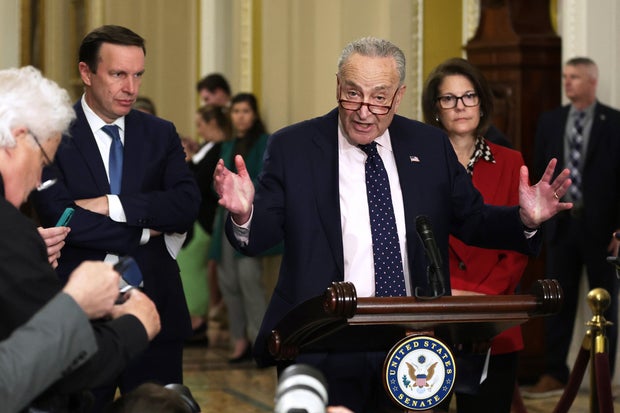Washington — The Senate on Thursday failed for a second time to advance a bipartisan border security measure that Republicans first blocked earlier this year after former President Donald Trump came out against it.
In the 43 to 50 vote, the measure fell short of the 60 votes needed to advance in the upper chamber.
The outcome was expected, and Democrats are trying to use Republicans’ opposition to shift public opinion in their favor as polls show voters are critical of President Biden’s handling of immigration. Border security has been a central theme of the Republican platform heading into the November election.
“The contrast between Democrats and Republicans is clear today and will be even clearer in November. Democrats want to fix the border and get something done. Republicans want to give speeches, let the border fester and do absolutely nothing to fix the problem,” Senate Majority Leader Chuck Schumer, a New York Democrat, said Thursday afternoon.
Republicans have “no good explanation” for why they won’t support the bill “other than Donald Trump told them to do a 180-degree about-face,” Schumer said.
Sen. Brian Schatz, a Hawaii Democrat, argued earlier in the day that Republicans who voted against the measure “chose to preserve chaos at the border” and “now this crisis is on them.”
At a news conference on the issue Wednesday, Schatz expressed anger at his Republican colleagues, saying they previously demanded that Democrats “get serious about the border.”
“Some of the Republicans that I respect the most were really forceful with us, and so we listened,” he said. “We developed a piece of legislation that I don’t love, but I know is tough enough to get the job done. Yet they abandoned ship because Donald Trump told them to do so.”
The border bill
After months of negotiations, Republicans and Democrats reached a compromise in February that would have been the first comprehensive border security policy overhaul in decades. It would have given the president far-reaching powers to restrict unlawful border crossings and tightened asylum rules, among other provisions.
Republicans had long insisted the measure was necessary for their support of additional aid to Ukraine. But Trump urged his allies to vote against it and it fell short of the 60 votes needed to advance in the Senate. Congress has since approved more aid to Ukraine, with Republican support, as part of a broader foreign aid package.
Republicans have argued that the president already has the power to stop the flow of migrants across the U.S.-Mexico border, claiming that the bipartisan deal to expand his authority would do little.
“Unfortunately, it doesn’t matter what law is on the books if the administration is not going to enforce the ones that already exist,” Sen Lindsey Graham, a South Carolina Republican, said Thursday in a floor speech.
In a statement after Thursday’s vote, Mr. Biden said Republicans “put partisan politics ahead of our country’s national security.”
“Congressional Republicans do not care about securing the border or fixing America’s broken immigration system. If they did, they would have voted for the toughest border enforcement in history,” he said, adding that he is “committed to taking action to address our broken immigration system.”
House Republican leadership said earlier this week that the bill was “dead on arrival” in the lower chamber in the unlikely event that it made it out of the Senate. House Speaker Mike Johnson, a Louisiana Republican, called the vote a waste of time and an attempt “to throw an election-year Hail Mary.”
The compromise measure was negotiated by Sen. James Lankford, an Oklahoma Republican; Sen. Chris Murphy, a Connecticut Democrat; and Sen. Kyrsten Sinema, an Arizona independent.
Lankford, one of four Republicans who voted in February to advance the measure, did not support it this time, calling it a “prop.”
“Today is a political messaging exercise,” he said during debate on the bill. “That doesn’t help us as a country.”
He called on Democrats and Republicans to continue to work toward finding a bipartisan solution.
Sinema criticized the procedural vote as “political theater” and “a show vote whose sole purpose is to point the finger back at the other party.”
“We don’t leave today with a political victory,” she said. “No one wins. No one gets the higher ground. Instead, we’re saying to each other, don’t step out. Don’t try to solve big problems. Stay in your partisan corner.”
Sen. Richard Blumenthal, a Connecticut Democrat, pushed back on criticism that the vote was simply to bolster Democrats’ messaging on the border.
“It is far more than a messaging vote. It will have tangible specific results in border security,” Blumenthal told reporters Wednesday.
Later in the day, in a floor speech, Blumenthal said Republicans refused to support the measure in February because they wanted to campaign on border issues.
“So for Republican colleagues now [to] claim that politics is the reason we’re here, well, yes — their politics, their presumptive presidential nominee saying that they should not vote for it because of the political advantage they would have from keeping it as an issue,” he said.
But as Democrats seek to shift the blame to Republicans, they also lost support within their own party. Sen. Cory Booker of New Jersey voted against it, saying the bill “includes several provisions that will violate Americans’ shared values” and “misses key components that can go much further in solving the serious immigration problems facing our nation.”
Alan He and Willie Inman contributed reporting.

